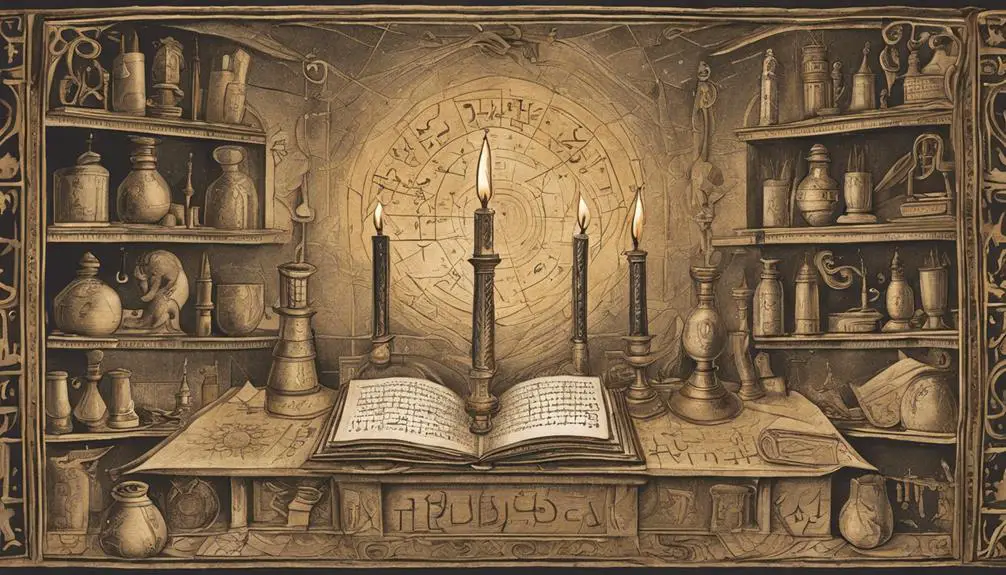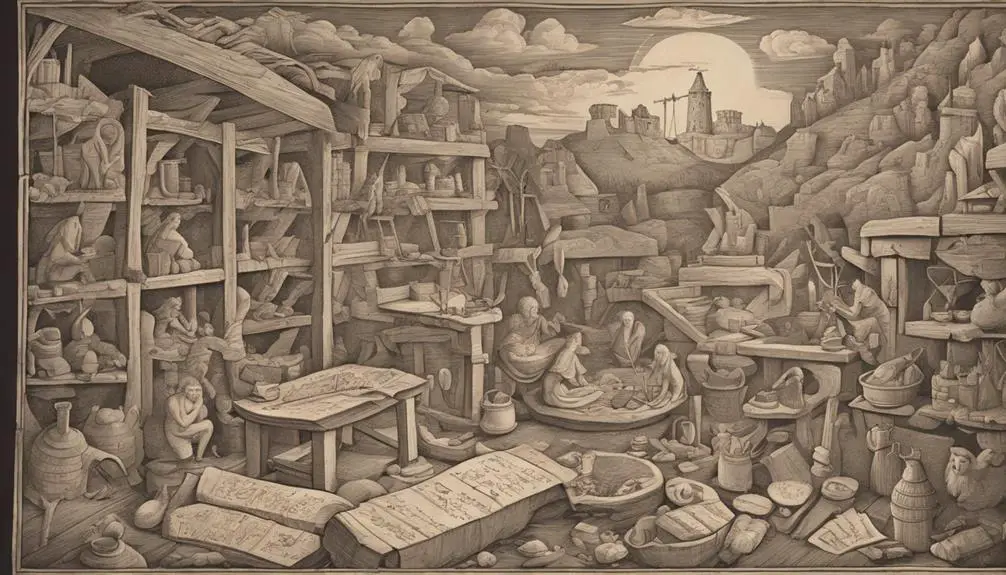Gain insights into the mystical journey of transformation with 'Alchemy in the Bible', where spiritual enlightenment meets ancient wisdom.

Alchemy in the Bible
Imagine stumbling upon an ancient manuscript, its pages whispering secrets of transformation and enlightenment. This image isn't far from the allure you'll find in exploring alchemy within the biblical context.
The Bible, rich with symbolic narratives and profound parables, holds keys to understanding the ancient practice of alchemy, not in the literal sense of turning lead into gold, but as a metaphor for spiritual refinement and wisdom.
As you explore the historical backdrop of alchemy and its intriguing connections to biblical symbols and stories, you'll uncover layers of meaning that might just change your perspective on wisdom and transformation.
What awaits is a journey through time and thought, revealing insights that remain as relevant today as they were centuries ago.
Key Takeaways
- Alchemy and biblical narratives both emphasize themes of transformation and spiritual enlightenment.
- Symbols like fire and water in alchemy parallel purification and rebirth motifs in the Bible.
- Stories of miraculous transformations in the Bible can be viewed through the lens of alchemical transmutation.
- The dialogue between alchemy and biblical wisdom underscores a universal quest for knowledge and soul refinement.
Historical Context of Alchemy

To understand the references to alchemy in the Bible, it's essential to delve into its historical context, which traces back to ancient civilizations' quest for transformation and enlightenment. This pursuit wasn't merely about turning base metals into gold; it was a metaphor for spiritual refinement and achieving a higher state of being. As you explore deeper, you'll find that medieval practices played a pivotal role in this journey. Alchemists of the Middle Ages weren't just early chemists; they were philosophers and theologians who bridged the gap between the spiritual and the material.
The evolution from these medieval practices to what we now recognize as scientific methods is a testament to alchemy's influence on the scientific evolution. It laid the groundwork for modern chemistry, pharmacology, and even psychology, symbolizing the union of science and spirituality. This blend of mystical and empirical inquiry provided a rich tapestry for interpreting the biblical references to transformation and renewal. As such, understanding alchemy's historical context enriches your appreciation of its presence in biblical texts, highlighting a centuries-old dialogue between humanity's spiritual aspirations and its quest for knowledge.
Biblical Symbols and Alchemy
Exploring biblical symbols reveals how deeply alchemy's quest for transformation resonates with scriptural narratives. At its core, alchemy blends mystical metallurgy with ancient chemistry, seeking not just the transmutation of base metals into gold but also the spiritual elevation of the alchemist. This pursuit mirrors the transformative journeys seen in the Bible, where symbols often carry layers of meaning, both physical and spiritual.
Consider the symbol of fire, prevalent in both alchemy and biblical texts. In alchemy, fire represents purification and the conversion of matter, akin to the refining fire mentioned in the Bible that purifies and sanctifies. Water, another pivotal symbol, signifies cleansing and rebirth in both traditions. Alchemists viewed it as the prima materia, the fundamental element necessary for the creation of the philosopher's stone, just as water is essential for baptism, symbolizing rebirth and purification in Christianity.
The intertwining of these symbols across alchemy and biblical narratives underscores a shared reverence for the transformative power of the divine. It highlights an enduring quest for understanding and aligning with the fundamental principles of creation, where mystical metallurgy and ancient chemistry serve as gateways to spiritual enlightenment.
Alchemical Themes in Biblical Stories

Within biblical narratives, we encounter numerous instances where alchemical themes of transformation and enlightenment vividly unfold, inviting you to ponder the profound connections between these ancient practices and sacred texts. Such stories often parallel the alchemist's elixir quest or the search for the Philosophers' stone—each symbolizing ultimate purity and divine wisdom.
Consider Moses' transformation of his staff into a serpent or the turning of water into blood. These miracles can be seen as allegorical representations of alchemical transmutation, where base substances are converted into something of greater value. Similarly, the story of Jesus turning water into wine at the wedding at Cana resonates with the alchemical pursuit of transformation, where the ordinary is elevated to the extraordinary, much like the quest for the Philosophers' stone that promises to turn base metals into gold.
The underlying theme in these narratives isn't just about physical transformation but hints at a deeper spiritual alchemy—where through faith, individuals undergo a profound internal enlightenment. This spiritual journey mirrors the alchemist's quest, where the ultimate goal isn't just the transformation of materials, but the elevation of the soul.
Wisdom and Transformation
At the heart of biblical teachings, wisdom and transformation serve as pivotal themes that challenge you to transcend the mundane and embrace a path of spiritual enlightenment. These concepts aren't merely abstract ideas; they're deeply rooted in mystical practices and esoteric teachings that are woven throughout the scriptures.
To understand how these themes manifest, consider the following:
- Wisdom in scripture often symbolizes more than just knowledge or good judgment. It represents a divine gift that guides you towards moral and spiritual purity, urging you to look beyond the surface and seek deeper truths.
- Transformation, within this context, isn't a simple change but a profound metamorphosis of the soul. It signifies the alchemical process of turning the base human character into a refined, spiritual essence, echoing the ancient pursuit of turning lead into gold.
- Mystical practices and esoteric teachings embedded in the Bible encourage you to engage in introspection and spiritual disciplines. These practices aren't just for understanding the divine but are tools for personal transformation, guiding you on a journey from ignorance to enlightenment.
Modern Interpretations and Insights

Reflecting on the ancient themes of wisdom and transformation, modern interpretations offer fresh insights that illuminate the enduring relevance of these concepts in contemporary spiritual journeys. As you delve deeper, it's essential to recognize how these interpretations navigate the delicate balance between scientific skepticism and the profound depths of spiritual practices. This analytical approach doesn't diminish the mystical allure; instead, it enriches our understanding by bridging the gap between the empirical and the metaphysical.
In today's world, the dialogue between science and spirituality is more vibrant than ever. You'll find that scientific skepticism serves not as a barrier but as a catalyst for deeper inquiry into the spiritual practices rooted in alchemical traditions. This intersection invites a reverent exploration of how ancient wisdom can inform and transform modern lives, offering a nuanced perspective that respects both empirical evidence and the ineffable mysteries of the spiritual realm.
Through this lens, alchemy in the Bible transcends its historical context, speaking to the universal quest for knowledge and transformation. It reminds you that the journey of spiritual growth is both an ancient path and a contemporary adventure, continually evolving as it weaves through the tapestry of human experience.
Frequently Asked Questions
How Does the Practice of Alchemy Contrast With the Biblical Teachings on the Nature of God and Creation?**
You're exploring how certain practices contrast with biblical teachings on God and creation. It's crucial to understand that biblical narratives emphasize divine intervention and creation ethics, principles that guide the universe's moral framework.
These teachings suggest that creation is an act of divine will, not merely a series of chemical or physical processes. This perspective highlights a reverence for the divine order and a caution against manipulating natural elements in ways that might contravene this sacred balance.
This Question Probes the Philosophical and Theological Differences Between Alchemical Practices, Which Often Seek to Manipulate or Transform the Natural World for Various Ends, and the Teachings Found in the Bible Regarding the Sanctity of Creation and the Role of Humanity in Relation to God's Creation.
You're peering into a philosophical chasm where natural theology and divine intervention intersect. This inquiry digs deep into the clash between attempts to morph the natural for personal gain and the biblical view of creation's sanctity and humanity's stewardship.
It's a scholarly probe into how divine laws frame our existence and the reverence owed to the Creator's work, contrasting sharply with alchemy's quest to bend these natural orders to human will.
Are There Any Specific Biblical Characters Who Could Be Considered Alchemists Based on Their Actions or Teachings?**
You're delving into whether any biblical figures embody alchemist-like traits through their actions or teachings.
Focusing on Moses' staff and Solomon's wisdom, neither were alchemists in the modern sense, but their stories reflect deep transformations and understanding.
Moses' staff, for instance, could transform physical reality, a metaphorical alchemy.
Solomon's wisdom, on the other hand, was about discerning truth, akin to alchemy's quest for understanding and transmuting the mundane into something profound.
This Explores the Intriguing Possibility of Interpreting Certain Biblical Figures Through the Lens of Alchemical Practices or Symbolism, Despite Not Being Explicitly Labeled as Such Within the Text.
You're diving into an exploration of figures who, while not explicitly named as alchemists, can be seen through a lens of mystical interpretations and symbolic parallels.
This approach invites you into a scholarly, yet reverent analysis, where you're encouraged to draw connections between their actions or teachings and the broader themes of transformation and enlightenment.
It's a fascinating endeavor that enriches your understanding of these characters beyond their traditional biblical portrayals.
How Have Different Christian Denominations Historically Viewed the Practice of Alchemy, Especially During the Middle Ages and the Renaissance?**
Navigating through the labyrinth of Christian denominations' views on alchemy during the Middle Ages and the Renaissance, you'll find a complex tapestry. Alchemy's symbolism wasn't universally embraced; medieval perceptions varied widely.
Some saw it as a spiritual quest, echoing the transformative journey of faith, while others deemed it heretical. The analytical and reverent discourse on this topic reveals the nuanced positions denominations adopted, reflecting broader theological and philosophical debates of their times.
Conclusion
As you've journeyed through the intertwining paths of alchemy and biblical narratives, it's clear that the quest for transformation and wisdom is as ancient as the mountains yet as relevant as tomorrow's sunrise.
These stories, rich with symbols and themes, serve as a crucible in which our understanding of spirituality and the pursuit of enlightenment are refined.
In this scholarly exploration, we see that the alchemy of the spirit isn't just a historical curiosity but a living, breathing guide for the soul's journey toward illumination.



Sign up